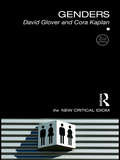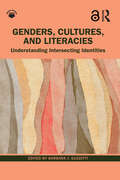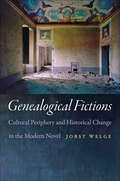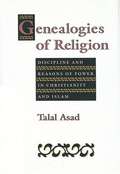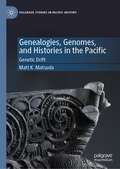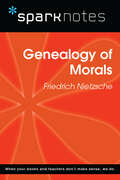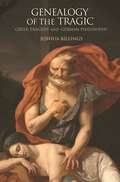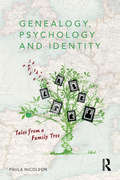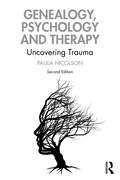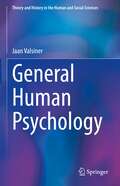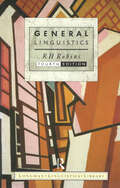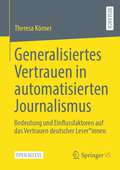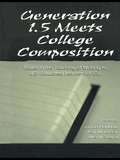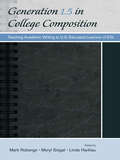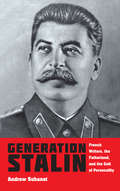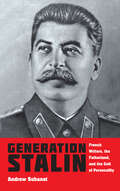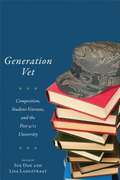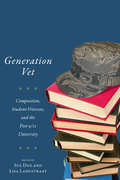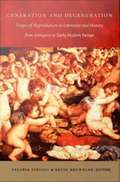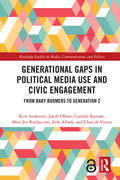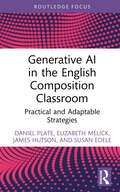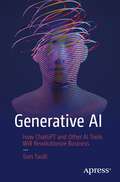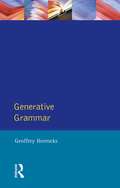- Table View
- List View
Genders (The New Critical Idiom)
by David Glover Cora KaplanThe concept of gender continues to be a central issue in literary and cultural studies, with a significance that crosses disciplinary boundaries and provokes lively debate. In this fully revised and updated second edition, David Glover and Cora Kaplan offer a lucid and illuminating introduction to ’gender’ and its implications, including: an overview of the critical language and concepts surrounding gender from their historical inception to contemporary debates discussions of the major theorists in the field updated and extended coverage of lesbian and queer theory a new glossary of terms essential to an understanding of the debate on gender in contemporary theory. With its impressive breadth and depth of coverage, this volume offers not only a comprehensive history of this complex term, but also indicates its ongoing presence in literary and cultural theory and the new directions it is taking.
Genders, Cultures, and Literacies: Understanding Intersecting Identities
by Barbara J. GuzzettiThis volume brings together leading scholars in their fields who offer much needed and wide-ranging perspectives on the intersections of genders, cultures, and literacies. As incidents of racial and gender aggression grow in number and in global attention, it is essential to understand how racial and gender identities and their expressions interplay and influence literacy development and practice. Contributors examine how social identities intersect and are expressed in literacy practices across an array of school and out-of-school settings and discuss how gender and race are represented in individuals’ multimodal practices. Chapters address such topics as the literacy practices of incarcerated fathers of color, Black girls’ literacies, Indigenous students’ cultural literacies, the writing practices of Latinx women for identity representation, and more. Ideal for scholars in literacy studies, gender studies, and cultural studies, this volume is a necessary and original update to the ways cultural, racial, and gender identities are viewed in current educational and sociocultural climates.
Genealogical Fictions: Cultural Periphery and Historical Change in the Modern Novel
by Jobst WelgeExplores the enduring link between national space and genealogy in the modern novel.Winner of the CHOICE Outstanding Academic Title of the Choice ACRLTaking its cue from recent theories of literary geography and fiction, Genealogical Fictions argues that narratives of familial decline shape the history of the modern novel, as well as the novel’s relationship to history. Stories of families in crisis, Jobst Welge argues, reflect the experience of historical and social change in regions or nations perceived as "peripheral." Though geographically and temporally diverse, the novels Welge considers all demonstrate a relation among family and national history, genealogical succession, and generational experience, along with social change and modernization. Welge’s wide-ranging comparative study focuses on the novels of the late nineteenth century, but it also includes detailed analyses of the pre-Victorian origin of the genealogical-historical novel and the evolution of similar themes in twentieth-century literature. Moving through time, he uncovers often-unsuspected novelistic continuities and international transformations and echoes, from Maria Edgeworth’s Castle Rackrent, published in 1800, to G. Tomasi di Lampedusa’s 1958 book Il Gattopardo.By revealing the "family resemblance" of novels from Great Britain, Italy, Spain, Portugal, and Brazil, this volume shows how genealogical narratives take on special significance in contexts of cultural periphery. Welge links private and public histories, while simultaneously integrating detailed accounts of various literary fields across the globe. In combining theories of the novel, recent discussions of cultural geography, and new approaches to genealogical narratives, Genealogical Fictions addresses a significant part of European and Latin American literary history in which texts from different national cultures illuminate each other in unsuspected ways and reveal the repetition, as well as the variation, among them. This book should be of interest to students and scholars of comparative literature, world literature, and the history and theory of the modern novel.
Genealogies of Religion: Discipline and Reasons of Power in Christianity and Islam
by Talal AsadIn Geneologies of Religion, Talal Asad explores how religion as a historical category emerged in the West and has come to be applied as a universal concept. The idea that religion has undergone a radical change since the Christian Reformation--from totalitarian and socially repressive to private and relatively benign--is a familiar part of the story of secularization. It is often invoked to explain and justify the liberal politics and world view of modernity. And it leads to the view that ""politicized religions"" threaten both reason and liberty. Asad's essays explore and question all these assumptions. He argues that ""religion"" is a construction of European modernity, a construction that authorizes--for Westerners and non-Westerners alike--particular forms of ""history making.
Genealogies, Genomes, and Histories in the Pacific: Genetic Drift (Palgrave Studies in Pacific History)
by Matt K. MatsudaThis book explores a panorama of historical studies, focused on the historical tensions between genealogical knowledge and well-known Pacific Islander engagements with genomic research in a postwar era of simultaneous decolonization and Big Science. These include connected examinations of ancient voyaging reconstruction and migration routes, “warrior genes,” a noted life-form patent case, questions of genetic engineering and biopiracy, the repatriation of ancestral remains, legacies of nuclear testing, and conflicts with the Human Genome Diversity Project in Oceania. It also considers the persistence of eugenics and race thinking within blood quanta and dispossession histories and how other histories are being written. Many of these subjects have been elaborated in detailed, specialist studies, but there is to date no single-volume overview of these multiple engagements that situates them all within a narrative framework of postwar racism and anti-racism, the technological promises of genetic science, and the cultural and political struggles and assertions of Indigenous islanders, whose voices structure and shape the arguments. It combines traditional archival and scholarly work with contemporary Islander commentary and research, and ranges from poetry to politics and molecular biology.
Genealogy of Morals (SparkNotes Philosophy Guide)
by SparkNotesGenealogy of Morals (SparkNotes Philosophy Guide) Making the reading experience fun! SparkNotes Philosophy Guides are one-stop guides to the great works of philosophy–masterpieces that stand at the foundations of Western thought. Inside each Philosophy Guide you&’ll find insightful overviews of great philosophical works of the Western world.
Genealogy of the Tragic: Greek Tragedy and German Philosophy
by Joshua BillingsWhy did Greek tragedy and "the tragic" come to be seen as essential to conceptions of modernity? And how has this belief affected modern understandings of Greek drama? In Genealogy of the Tragic, Joshua Billings answers these and related questions by tracing the emergence of the modern theory of the tragic, which was first developed around 1800 by thinkers associated with German Idealism. The book argues that the idea of the tragic arose in response to a new consciousness of history in the late eighteenth century, which spurred theorists to see Greek tragedy as both a unique, historically remote form and a timeless literary genre full of meaning for the present. The book offers a new interpretation of the theories of Schiller, Schelling, Hegel, Hölderlin, and others, as mediations between these historicizing and universalizing impulses, and shows the roots of their approaches in earlier discussions of Greek tragedy in Germany, France, and England. By examining eighteenth-century readings of tragedy and the interactions between idealist thinkers in detail, Genealogy of the Tragic offers the most comprehensive historical account of the tragic to date, as well as the fullest explanation of why and how the idea was used to make sense of modernity. The book argues that idealist theories remain fundamental to contemporary interpretations of Greek tragedy, and calls for a renewed engagement with philosophical questions in criticism of tragedy.
Genealogy, Psychology and Identity: Tales from a family tree
by Paula NicolsonThe popularity of amateur genealogy and family history has soared in recent times. Genealogy, Psychology and Identity explores this popular international pastime and offers reasons why it informs our sense of who we are, and our place in both contemporary culture and historical context. We will never know any of the people we discover from our histories in person, but for several reasons we recognize that their lives shaped ours. Paula Nicolson draws on her experiences tracing her own family history to show how people can connect with archival material, using documents and texts to expand their knowledge and understanding of the psychosocial experiences of their ancestors. Key approaches to identity and relationships lend clues to our own lives but also to what psychosocial factors run across generations. Attachment and abandonment, trusting, being let down, becoming independent, migration, health and money, all resonate with the psychological experiences that define the outlooks, personalities and the ways that those who came before us related to others. Nicolson highlights the importance of genealogy in the development of identity and the therapeutic potential of family history in cultivating well-being that will be of interest to those researching their own family tree, genealogists and counsellors, as well as students and researchers in social psychology and social history.
Genealogy, Psychology and Therapy: Uncovering Trauma
by Paula NicolsonFully revised and updated, Genealogy, Psychology and Therapy highlights the importance of genealogy in the development of identity, and the therapeutic potential of family history in cultivating wellbeing. The popularity of amateur genealogy and family history has soared in recent times. We will never know any of the people we discover from our histories in person, but for several reasons, we recognize that their lives shaped ours. Key approaches to identity and relationships lend clues to our own lives but also to what psychosocial factors run across generations. Attachment and abandonment, trusting, being let down, becoming independent, migration, health and money, all resonate with the psychological experiences that define the outlooks, personalities and the ways that those who came before us related to others. This new edition builds on the original book, Genealogy, Psychology, and Identity, by highlighting the work of Erik Erikson along with studies of the quality of attachment, historical social conditions especially war, forced migration, health inequalities and financial uncertainty, to enable a more detailed understanding of trauma and its long shadow, and to focus on how genealogy informs our identities and emotional health status, exploring the transmission of trauma across generations. The intergenerational transmission of trauma is examined using analysis of real-life family examples, alongside an assessment of a narrative therapy approach to healing. The book expands on how psychological practices together with genealogical evidence may impart resilience and emotional repair, and develops the discussion of the psychological methods by which we interconnect in a reflective way with material from archival databases, family stories and photographs and other sources including DNA. Showing how people can connect with archival material, using documents and texts to expand their knowledge and understanding of the psychosocial experiences of their ancestors, this book will be of interest to those researching their own family tree, genealogists and counsellors, as well as students and researchers in social psychology and social history.
General Human Psychology (Theory and History in the Human and Social Sciences)
by Jaan ValsinerThe book includes a new theoretical synthesis of William Stern’s classic personology published in the 1930s with contemporary cultural psychology of semiotic mediation developed by the author over the last two decades. It looks at the human mind as it operates in its full complexity, starting from the most complex general levels of aesthetic and political participation in society and ending with individual willful actions in everyday life contexts.
General Linguistics (Longman Linguistics Library)
by R.H. RobinsThe fourth edition of General Linguistics provides a comprehensive and accessible introduction to linguistics.The book considers:- semantics and pragmatics- dialect and style- phonetics and phonology- morphology and syntax, with reference both to traditional and current theories- comparative-historical linguistics and linguistic typology- linguistics' relation to other disciplines- the practical application of linguistics- the 2,500 years of linguistic thought that lies behind what we do and think today
General Linguistics (Longman Linguistics Library)
by R.H. RobinsThe fourth edition of General Linguistics provides a comprehensive and accessible introduction to linguistics.The book considers:- semantics and pragmatics- dialect and style- phonetics and phonology- morphology and syntax, with reference both to traditional and current theories- comparative-historical linguistics and linguistic typology- linguistics' relation to other disciplines- the practical application of linguistics- the 2,500 years of linguistic thought that lies behind what we do and think today
Generalisiertes Vertrauen in automatisierten Journalismus: Bedeutung und Einflussfaktoren auf das Vertrauen deutscher Leser*innen
by Theresa KörnerIn diesem Open-Access-Buch geht es um die Frage, wie Leser*innen in Deutschland automatisiert generierte Nachrichten wahrnehmen und welche Bedeutung sie den Verfahren im Journalismus zuschreiben. Im Mittelpunkt steht die Frage, ob das Publikum dem automatisierten Journalismus vertraut und welche Einflussfaktoren bei dieser Entscheidung eine Rolle spielen. Zur empirischen Überprüfung wurden Focus Groups mit gezielt rekrutierten Leser*innen eingesetzt. Die Ergebnisse zeigen, dass es keine monokausalen Antworten auf die Frage nach dem Vertrauen der Lesenden in automatisierten Journalismus gibt. Grundsätzlich stehen sie dem Technologieeinsatz neutral und gleichzeitig neugierig sowie – vor allem mit Blick auf die Zukunft – skeptisch gegenüber. Die Teilnehmenden fordern einen transparenten Umgang der Medienorganisationen mit automatisierter Berichterstattung und wollen mehr Informationen zum Einsatz, zur Verbreitung und zur Technologie haben. Als Einflussfaktoren auf die Vertrauensbewertung wurden ausgewählte Personen- sowie Text- und Publikationsmerkmale und Eigenschaften des Untersuchungsgegenstands getestet. Hohe Relevanz haben erkennbar die Angst vor gezielter Manipulation, die individuellen Vorstellungen über Künstliche Intelligenzen sowie die Kontingenz von Texten.Dies ist ein Open-Access-Buch.
Generation 1.5 Meets College Composition: Issues in the Teaching of Writing To U.S.-Educated Learners of ESL
by Kay M. Losey Linda Harklau Meryl SiegalAn increasing number of students graduate from U.S. high schools and enter college while still in the process of learning English. This group--the "1.5 generation"--consisting of immigrants and U.S. residents born abroad as well as indigenous language minority groups, is rapidly becoming a major constituency in college writing programs. These students defy the existing categories in most college writing programs, and in the research literature. Experienced in American culture and schooling, they have characteristics and needs distinct from the international students who have been the subject of most research and literature on ESL writing. Furthermore, in studies of mainstream college composition, basic writing, and diversity, these students' status as second-language learners is usually left unaddressed or even misconstrued as underpreparation. Nevertheless, research and pedagogical writings have yet to take up the particular issues entailed in teaching composition to this student population. The intent in this volume is to bridge this gap and to initiate a dialogue on the linguistic, cultural, and ethical issues that attend teaching college writing to U.S.-educated linguistically diverse students. This book is the first to address explicitly issues in the instruction of "1.5 generation" college writers. From urban New York City to midwestern land grant universities to the Pacific Rim, experienced educators and researchers discuss a variety of contexts, populations, programs, and perspectives. The 12 chapters in this collection, authored by prominent authorities in non-native language writing, are research based and conceptual, providing a research-based survey of who the students are, their backgrounds and needs, and how they are placed and instructed in a variety of settings. The authors frame issues, raise questions, and provide portraits of language minority students and the classrooms and programs that serve them. Together, the pieces paint the landscape of college writing instruction for 1.5 generation students and explore the issues faced by ESL and college writing programs in providing appropriate writing instruction to second-language learners arriving from U.S. high schools. This book serves not only to articulate an issue and set an agenda for further research and discussion, but also to suggest paths toward linguistic and cultural sensitivity in any writing classroom. It is thought-provoking reading for college administrators, writing teachers, and scholars and students of first- and second-language composition.
Generation 1.5 in College Composition: Teaching Academic Writing to U.S.-Educated Learners of ESL
by Mark Roberge Linda Harklau Meryl Siegal'… A well-organized volume with a strong emphasis on pedagogy.' – Trudy Smoke, Hunter College/City University of New York, USA 'Generation 1.5 is the most interesting topic of concern in ESL today, yet publications are few and far between.... The editors clearly know what they’re doing…. They know the field, know the subject matter, and understand the problems…. This volume contributes to the thinking in the field.' – Linda Lonon Blanton, University of New Orleans, USA Building on the work that has been done over the past decade, this volume provides theoretical frameworks for understanding debates about immigrant students, studies of students’ schooling paths and language and literacy experiences, and pedagogical approaches for working with Generation 1.5 students. Generation 1.5 in College Composition: is designed to help both scholars and practitioners reconceptualize the fields of College Composition and TESOL and create a space for research, theory, and pedagogy focusing on postsecondary immigrant ESL students provides both important new theoretical work (which lays the underpinnings for serious pedagogical innovation) and important new pedagogical approaches. Because of their varied and complex language and literacy profiles, Generation 1.5 students are found in developmental English courses, college ESL courses, and mainstream college writing courses. This volume is directed to preservice and inservice teachers, teacher educators, and researchers involved with educating Generation 1.5 students in these and other contexts.
Generation Stalin: French Writers, the Fatherland, and the Cult of Personality
by Andrew SobanetGeneration Stalin traces Joseph Stalin’s rise as a dominant figure in French political culture from the 1930s through the 1950s. Andrew Sobanet brings to light the crucial role French writers played in building Stalin’s cult of personality and in disseminating Stalinist propaganda in the international Communist sphere, including within the USSR. Based on a wide array of sources—literary, cinematic, historical, and archival—Generation Stalin situates in a broad cultural context the work of the most prominent intellectuals affiliated with the French Communist Party, including Goncourt winner Henri Barbusse, Nobel laureate Romain Rolland, renowned poet Paul Eluard, and canonical literary figure Louis Aragon. Generation Stalin arrives at a pivotal moment, with the Stalin cult and elements of Stalinist ideology resurgent in twenty-first-century Russia and authoritarianism on the rise around the world.
Generation Stalin: French Writers, the Fatherland, and the Cult of Personality
by Andrew SobanetA look at how four French writers of the 1930s, ‘40s, and ‘50s contributed to the rise of Stalin in their country and abroad.Generation Stalin traces Joseph Stalin’s rise as a dominant figure in French political culture from the 1930s through the 1950s. Andrew Sobanet brings to light the crucial role French writers played in building Stalin’s cult of personality and in disseminating Stalinist propaganda in the international Communist sphere, including within the USSR. Based on a wide array of sources—literary, cinematic, historical, and archival—Generation Stalin situates in a broad cultural context the work of the most prominent intellectuals affiliated with the French Communist Party, including Goncourt winner Henri Barbusse, Nobel laureate Romain Rolland, renowned poet Paul Eluard, and canonical literary figure Louis Aragon. Generation Stalin arrives at a pivotal moment, with the Stalin cult and elements of Stalinist ideology resurgent in twenty-first-century Russia and authoritarianism on the rise around the world.“This is an outstanding work of intellectual history. . . . Highly recommended.” —Choice“A landmark study, brilliantly written, containing exemplary scholarship. Sobanet establishes himself with this volume as one of the foremost interpreters of French intellectual life. He brings to his study a cornucopia of historical knowledge and the finesse of a first-class literary critic.” —Lawrence D. Kritzman, editor of The Columbia History of Twentieth-Century French Thought“This is an ambitious project that is well executed, with a readership that is potentially far reaching—with implications for Russian/Stalin studies, French studies, including politics and society, as well as propaganda writing and the role of the media more generally. . . . Generation Stalin is a very timely book.” —Denis M. Provencher, author of Queer French: Globalization, Language, and Sexual Citizenship in France“Sobanet’s study of “Generation Stalin” and the four writers he associates with the group, Henri Barbusse, Romain Rolland, Paul Eluard, and Louis Aragon, is, quite simply, magisterial. Written in lucid prose informed by meticulous and wide-ranging scholarship including archival material, books, essays, press items, and other relevant documents, the book provides an in-depth study of the rise of the Stalin cult in France.” —Carol J. Murphy, author of The Allegorical Impulse in the Works of Julien Gracq: History as Rhetorical Enactment in “Le Rivage des Syrtes” and “Un Balcon en forêt”
Generation Vet
by Lisa Lanstraat Sue DoeInstitutions of higher education are experiencing the largest influx of enrolled veterans since World War II, and these student veterans are transforming post-secondary classroom dynamics. While many campus divisions like admissions and student services are actively moving to accommodate the rise in this demographic, little research about this population and their educational needs is available, and academic departments have been slower to adjust. In Generation Vet, fifteen chapters offer well-researched, pedagogically savvy recommendations for curricular and programmatic responses to student veterans for English and writing studies departments.In work with veterans in writing-intensive courses and community contexts, questions of citizenship, disability, activism, community-campus relationships, and retention come to the fore. Moreover, writing-intensive courses can be sites of significant cultural exchanges--even clashes--as veterans bring military values, rhetorical traditions, and communication styles that may challenge the values, beliefs, and assumptions of traditional college students and faculty.This classroom-oriented text addresses a wide range of issues concerning veterans, pedagogy, rhetoric, and writing program administration. Written by diverse scholar-teachers and written in diverse genres, the essays in this collection promise to enhance our understanding of student veterans, composition pedagogy and administration, and the post-9/11 university.
Generation Vet: Composition, Student Veterans, and the Post-9/11 University
by Sue Doe and Lisa LangstraatInstitutions of higher education are experiencing the largest influx of enrolled veterans since World War II, and these student veterans are transforming post-secondary classroom dynamics. While many campus divisions like admissions and student services are actively moving to accommodate the rise in this demographic, little research about this population and their educational needs is available, and academic departments have been slower to adjust. In Generation Vet, fifteen chapters offer well-researched, pedagogically savvy recommendations for curricular and programmatic responses to student veterans for English and writing studies departments. In work with veterans in writing-intensive courses and community contexts, questions of citizenship, disability, activism, community-campus relationships, and retention come to the fore. Moreover, writing-intensive courses can be sites of significant cultural exchanges—even clashes—as veterans bring military values, rhetorical traditions, and communication styles that may challenge the values, beliefs, and assumptions of traditional college students and faculty. This classroom-oriented text addresses a wide range of issues concerning veterans, pedagogy, rhetoric, and writing program administration. Written by diverse scholar-teachers and written in diverse genres, the essays in this collection promise to enhance our understanding of student veterans, composition pedagogy and administration, and the post-9/11 university.
Generation and Degeneration: Tropes of Reproduction in Literature and History from Antiquity Through Early Modern Europe
by Valeria Finucci Kevin BrownleeThis distinctive collection explores the construction of genealogies--in both the biological sense of procreation and the metaphorical sense of heritage and cultural patrimony. Focusing specifically on the discourses that inform such genealogies, Generation and Degeneration moves from Greco-Roman times to the recent past to retrace generational fantasies and discords in a variety of related contexts, from the medical to the theological, and from the literary to the historical. The discourses on reproduction, biology, degeneration, legacy, and lineage that this book broaches not only bring to the forefront concepts of sexual identity and gender politics but also show how they were culturally constructed and reconstructed through the centuries by medicine, philosophy, the visual arts, law, religion, and literature. The contributors reflect on a wide range of topics--from what makes men "manly" to the identity of Christ's father, from what kinds of erotic practices went on among women in sixteenth-century seraglios to how men's hemorrhoids can be variously labeled. Essays scrutinize stories of menstruating males and early writings on the presumed inferiority of female bodily functions. Others investigate a psychomorphology of the clitoris that challenges Freud's account of lesbianism as an infantile stage of sexual development and such topics as the geographical origins of medicine and the materialization of genealogy in the presence of Renaissance theatrical ghosts. This collection will engage those in English, comparative, Italian, Spanish, and French studies, as well as in history, history of medicine, and ancient and early modern religious studies. Contributors. Kevin Brownlee, Marina Scordilis Brownlee, Elizabeth Clark, Valeria Finucci, Dale Martin, Gianna Pomata, Maureen Quilligan, Nancy Siraisi, Peter Stallybrass,Valerie Traub
Generational Gaps in Political Media Use and Civic Engagement: From Baby Boomers to Generation Z (Routledge Studies in Media, Communication, and Politics)
by Erik Albæk Kim Andersen Jakob Ohme Camilla Bjarnøe Mats Joe Bordacconi Claes H De VreeseThis book investigates news use patterns among five different generations in a time where digital media create a multi-choice media environment. The book introduces a new model – The EPIG Model (Engagement-Participation-Information*Generation) – to study how different generational cohorts’ exposure to political information is related to their political engagement and participation. The authors build on a multi-method framework to determine direct and indirect media effects across generations. The unique dataset allows for comparison of effects between legacy and social media use and helps to disentangle the influence on citizens’ political involvement in nonelection as well as during political campaign times. Bringing the newly of-age Generation Z into the picture, the book presents an in-depth understanding of how a changing media environment presents different challenges and opportunities for political involvement of this, as well as older generations. Bringing the conversation around political engagement and the media up to date for the new generation, this book will be of key importance to scholars and students in the areas of media studies, communication studies, technology, political science and political communication.
Generative AI in Writing Education: Policy and Pedagogical Implications (Routledge Research in Writing Studies)
by Dylan MedinaThis book provides a theoretical framework to allow educators, researchers, and policymakers to better understand computer‑generated writing and the policy and pedagogical implications of generative AI.Generative AI, such as ChatGPT and Gemini, has substantially disrupted educational spaces, forcing educators, policymakers, and other stakeholders to reconsider writing and how it should be used in education. Responding to this disruption, this book provides technically sound guidance on how various stakeholders should engage with generative AI. After providing a foundational and technical discussion of the technology, this book directly addresses the educational context. Informed by theories of learning and knowledge transfer and utilizing rhetorical theories of writing, this book assesses the impact of AI on student learning, student performance, and academic honesty and integrity. In doing so, the book outlines how generative AI can be both a help and a hindrance for students, enabling readers to craft informed and meaningful policies and successfully integrate AI in the composition classroom.This book will be of interest to scholars in the fields of Rhetoric and Composition, Technical Writing, Communication Studies, Linguistics, and TESOL, as well as to Education and Machine Learning policymakers, program directors, and researchers.
Generative AI in the English Composition Classroom: Practical and Adaptable Strategies (Routledge Research in Writing Studies)
by James Hutson Daniel Plate Elizabeth Melick Susan EdeleDesigned to cater to the needs of both novice and seasoned writing instructors, this book provides a range of practical and adaptable strategies for integrating generative artificial intelligence (AI) into English writing curricula.Generative AI in the English Composition Classroom proposes strategic methodologies to ensure that AI is utilized as a facilitator of learning and creativity, rather than as a shortcut to academic success. With a particular emphasis on sophisticated large language models such as Claude, ChatGPT, and Gemini, this book critically addresses potential challenges, including concerns related to academic integrity. It includes case studies and practical strategies to exemplify how AI can enhance the writing process while emphasizing the continuing importance of a solid foundation in writing structure, processes, and rhetorical strategies. These case studies and strategies are designed for immediate application, offering educators and students practical tools to effectively navigate AI-augmented writing environments. Finally, the book looks to the future, discussing the evolving skillsets required in the workforce and how educators can equip students for a future in which AI is an integral component.A forward-thinking and invaluable guide, this book will be of interest to educators involved in teaching English Composition and writing.
Generative AI: How ChatGPT and Other AI Tools Will Revolutionize Business
by Tom TaulliThis book will show how generative technology works and the drivers. It will also look at the applications – showing what various startupsand large companies are doing in the space. There will also be a look at the challenges and risk factors.During the past decade, companies have spent billions on AI. But the focus has been on applying the technology to predictions – which is known as analytical AI. It can mean that you receive TikTok videos that you cannot resist. Or analytical AI can fend against spam or fraud or forecast when a package will be delivered. While such things are beneficial, there is much more to AI. The next megatrend will be leveraging the technology to be creative. For example, you could take a book and an AI model will turn it into a movie – at very little cost. This is all part of generative AI. It’s still in the nascent stages but it is progressing quickly. Generative AI can already create engaging blog posts, social media messages, beautiful artwork and compelling videos.The potential for this technology is enormous. It will be useful for many categories like sales, marketing, legal, product design, code generation, and even pharmaceutical creation.What You Will LearnThe importance of understanding generative AIThe fundamentals of the technology, like the foundation and diffusion modelsHow generative AI apps workHow generative AI will impact various categories like the law, marketing/sales, gaming, product development, and code generation.The risks, downsides and challenges.Who This Book is ForProfessionals that do not have a technical background. Rather, the audience will be mostly those in Corporate America (such as managers) as well as people in tech startups, who will need an understanding of generative AI to evaluate the solutions.
Generative Grammar (Longman Linguistics Library)
by Geoffrey HorrocksThis book provides a critical review of the development of generative grammar, both transformational and non-transformational, from the early 1960s to the present, and presents contemporary results in the context of an overall evaluation of recent research in the field.Geoffrey Horrocks compares Chomsky's approach to the study of grammar, culminating in Government and Binding theory, with two other theories which are deliberate reactions to this framework: Generalised Phrase Structure Grammar and Lexical-Functional Grammar. Whilst proponents of all three models regard themselves as generative grammarians, and share many of the same objectives, the differences between them nevertheless account for much of the recent debate in this subject. By presenting these different theories in the context of the issues that unite and divide them, the book highlights the problems which arise in any attempt to establish an adequate theory of grammatical representation.
